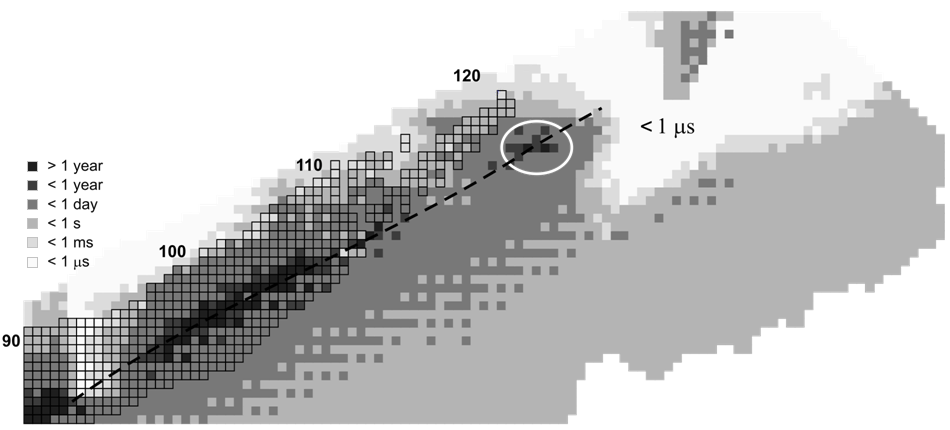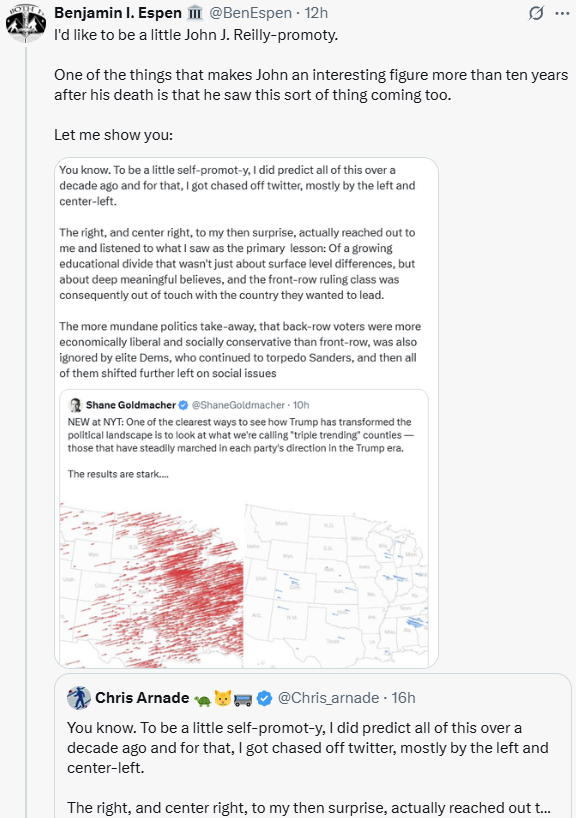The Long View 2006-05-04: Mousssaoui; Nagin; Benedict; The Islands of Stability

The still center around which all else rotates
Essences or forms are widely misunderstood in a materialistic age. Nonetheless, everything tends to point to the reality of essences, if you know what you are looking at.
Mousssaoui; Nagin; Benedict; The Islands of Stability
I'm as bloodthirsty as the next guy, but I think that Peggy Noonan is quite wrong when she deplores the fact that a federal sentencing jury yesterday gave Zacarias Moussaoui life in prison instead of death for his association with the 911 plot:
Excuse me, I'm sorry, and I beg your pardon, but the jury's decision on Moussaoui gives me a very bad feeling. What we witnessed here was not the higher compassion but a dizzy failure of nerve.
I think perhaps that all we saw was another jury responding badly to another of the Bush Justice Department's "What the Hell were they thinking of?" prosecutions. The prosecutors had nothing. All that could have saved them was Moussaoui's transparent attempt on the witness stand to incriminate himself, the better to join the ranks of the martyrs. The jury thought, correctly, that he was exaggerating his own importance, and they saw no reason to help him do it.
Noonan does make some good points about the dangers of giving such a defendant life:
I don't want to end with an air of hopelessness, so here's some hope, offered to the bureau of prisons. I hope he doesn't get cable TV in his cell. I hope he doesn't get to use his hour a day in general population getting buff and converting prisoners to jihad. I hope he isn't allowed visitors with whom he can do impolite things like plot against our country. I hope he isn't allowed anniversary interviews. I hope his jolly colleagues don't take captives whom they threaten to kill unless Moussaoui is released.
I would insist that he be made to watch cable television, and that he have no way to channel surf or turn down the sound during the commercials. Noonan's last item is a real consideration, however. If letting a convicted killer live means putting innocents in danger, then the argument that the death penalty is not needed as a deterrent collapses.
* * *
Mayor Nagin of New Orleans is not my favorite executive. A Tulane University historian, Douglas Brinkley has written a quickie book, The Great Deluge: Hurricane Katrina, New Orleans, and the Mississippi Gulf Coast, to help to promulgate that sentiment, just in time for the run-off election for mayor. However, this synopsis from The Daily News causes me to think rather better of Nagin:
In excerpts published yesterday in Vanity Fair, Brinkley describes Nagin as spending most of the week after the storm holed up on the 27th floor of the Hyatt Hotel, looking down on the misery of the Superdome...With all power out, visitors had to climb the stairs if they wanted to talk with him. Brinkley also describes the mayor scurrying to the roof when a cop warned that rabble-rousers were leading a mob to the hotel from the Superdome.
In other words, he was in the city during the worst of it. He did not just run to Baton Rouge or Houston. He deserves to be defeated not for cowardice, but for incompetence.
* * *
These quotations from an Egyptian Jesuit (yes, there is such a creature) deal with Benedict XVI's attitude toward Islam, but they are more interesting as a window into the pope's views on church, state, and reason:
“We do not want to create an empire of power, but we have something that can be communicated and towards which an expectation of our reason tends. It is communicable because it belongs to our shared human nature and there is a duty to communicate on the part of those who have found a treasure of truth and love. Rationality was therefore a postulate and condition of Christianity, which remains a European legacy for comparing ourselves peacefully and positively, with Islam and also the great Asian religions.”
Therefore, for the pope, dialogue is at this level, i.e. founded on reason.
"Our constitutions": it is difficult to imagine a pope of the 19th and even most of the 20th century saying such a thing, but maybe less hard to imagine of the relaxed papacy of the 18th century, when the revolutionary Republic of Corsica and the Emperor Joseph's policy of imperial tolerance fit comfortably under the broad tent of Rococo Catholicism. The Enlightenment meant many things, from the earnest but fundamentally rational spirituality of the Methodists to the penny dreadful ambitions of the Illuminati. In these views of Benedict XVI, we see the Enlightenment at its sunniest. Indeed, the Enlightenment in this sense is durable, in a way that the revolutionary tradition, laicism, and postmodernism are not. As I have noted, Benedict has spoken with favor of US political culture as an institutionalization of the Enlightenment in this sense.
Readers may have noticed that I am developing a tiresome theory about this. The postmodern trick of dismissing any ideal form as "essentialism" is a misdirection. By "essence" in this case we do not mean a stuff, but an island of stability, one of the possibilities that the world offers for a stable situation. The chemical elements are the islands of stability offered by quantum mechanics. The eight anatomies found in animals are the possibilities for biology offered by polymer chemistry. Similarly, there is only a small set of possible societies and cultural configurations. These basic forms are attractive, in the way that strange attractors are attractive: it is easier to fall into them than to fall away from them.
The moral, then, is that democratic liberalism, understood as articles of peace rather than as a license to launch cultural revolution, is not an early stop on the ride to the Finland Station, but what Spengler would have called a "final form" of the West, the distillation of the history of a whole Culture. Like baroque music, which is also a final form from much the same period, it's as good as the world gets.
As I have noted before, The Glass Bead Game is really Spenglerian science fiction, set in a future in which the preservation of these cultural treasures is a central goal of public policy. Frankly, one could easily imagine Benedict XVI as a Player at Waldzell.
* * *
Some people have other ideas, as we see in this Orthodox defense of divine monarchy:
The secular state is always atheistic. St. Gregory the Theologian observed in the 4th century that there are three fundamental kinds of government: monarchy, the rule of one, is associated with belief in one God or, at least, one supreme God. Polyarchy (aristocracy, the rule of the few or best, is linked with polytheism; and the rule of the many, which the Saint called Anarchy (democracy), is bound with atheism. We Orthodox, be it said, hold monarchy "in honour", because it imitates the unity of God, whereas polyarchy implies a division or dispersion of His Power, a "severance of His Essence," that is, among many gods. Finally, anarchy, the government of the people, implies theologically that the Essence of God is pulverized; or, in other words, power is so completely spread out or distributed that He cannot be conceived to exist (Theol. Ora. III, 2). We ought not be confused by St. Gregory's explanation. He did not mean that nations always make conscious, philosophically elaborated choices, but that there is always a direct connection between theology and politics.
I would have to do the research (and maybe someone has done it already), but I suspect that the defense of autocracy, as distinguished from monarchy, is new (i.e.: a product of the last 200 years). Certianly autocracy is not an island of stability: an autocracy is the Hindenburg waiting for Fritz to sneak a smoke among the gasbags.
* * *
Immunity to advertising is not one of my gifts, and yes, I do watch Lost. So, here are two sites for you.
This one is cryptic. You deserve a cookie if you find the hidden text.
And here this Hanso Foundation. Life extension, electromagnetic radiation, clinical psychiatry: I can see how it all fits together. Can't you?
Copyright © 2006 by John J. Reilly




Comments ()